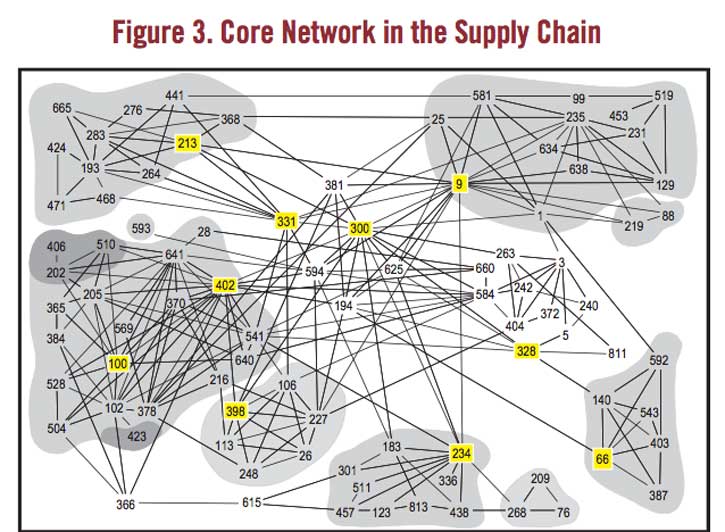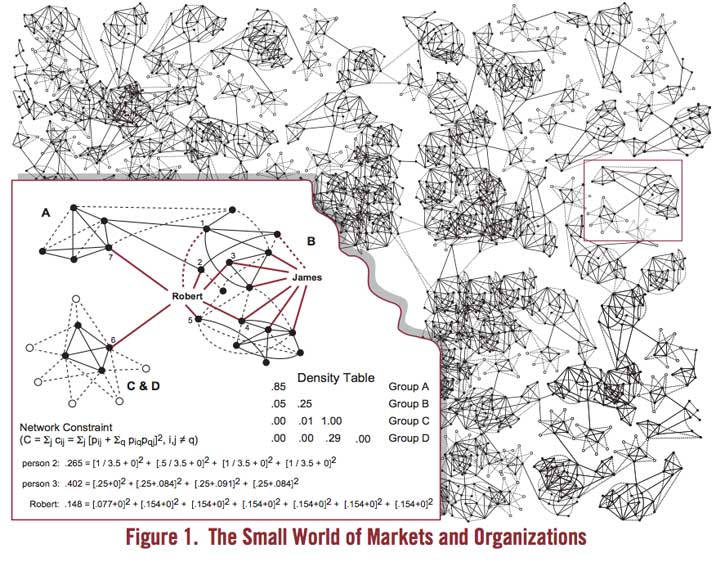

IN THE HANDS OF A FEW:
Idea generation at some point involves someone moving knowledge from this group to that, or combining bits of knowledge across groups. Where brokerage is social capital, there should be evidence of brokerage associated with good ideas, and vice versa.
The hypothesis of this paper is that people who stand near the holes in social structure are a higher risk of having good ideas. The argument is that opinion and behavior are more homogenous within that between groups, so people connected across groups are more familiar with the alternative ways of thinking and behaving, which gives them more options to select and synthesize from alternatives. New ideas emerge from selection and synthesis across the structural holes between groups. Some fraction of those new ideas are good. "Good" will take on specific meaning with empirical data, but for the moment let a good idea be broadly understood to be one that other praise and value."
Read the whole article as a PDF here.
Great summary article about it on CLOUD Ave.
IN THE HANDS OF OTHERS:
If this is to much detail for simply being social, collaborative, or creative, check out the concept that "Thinking Inside the Box" is actually better than the overly used idea that creativity lies in thinking outside the box. Here is a 10 minute talk by Dan Heath, author of the bestselling book Made-to-Stick.
Fast Company also has a great article on using what's around us to solve problems. Here is the introduction:
"Your business has a big problem. You've thought about it, but you can't seem to crack it. So you consult your colleagues -- to no avail. Then you turn to the big guns -- your industry's top experts. They've got nothing. (Well, to be precise, they've got 40 PowerPoint slides worth of nothing, and you've got $225,000 less of something.) Now what?
You might take some inspiration from Pete Foley, associate director of the cognitive science group at Procter & Gamble, who was looking for an inspired solution to challenges faced by P&G's feminine-care business unit. Its R&D staff had pursued several approaches, but none of them offered the breakthrough that Foley craved. So he did the next logical thing: He took his team to the San Diego Zoo.
The zoo is developing a specialty in biomimicry, a discipline that tries to solve problems by imitating the ingenious and sustainable answers provided by nature. In a working session with the company, the zoo's biomimicry experts made an unexpected connection between P&G's problem and the physiology of a gecko. Other ideas came quickly, inspired by flower petals, armadillos, squirrels, and anteaters. (Full disclosure: Chip led a workshop with the biomimicry team on another issue.) By the end of the day, the working group had generated eight fresh approaches to the challenge. It was as if Ideo had opened an office on Noah's Ark."
Read the full article: A Problem-Solvers Guide to Copycatting
The New York Times also weighs in on creativity in collaboration:
"The usual image of creativity is that it's some sort of genetic gift, some heroic act," Mr. Burt said. "But creativity is an import-export game. It's not a creation game."
Read the full article: Where to Get a Good Idea: Steal it Outside Your Group
Two excellent past articles (SCENARIOS and SKITS) give specific instruction on how you can put some of the ideas in the above articles into practical use in your workplace.